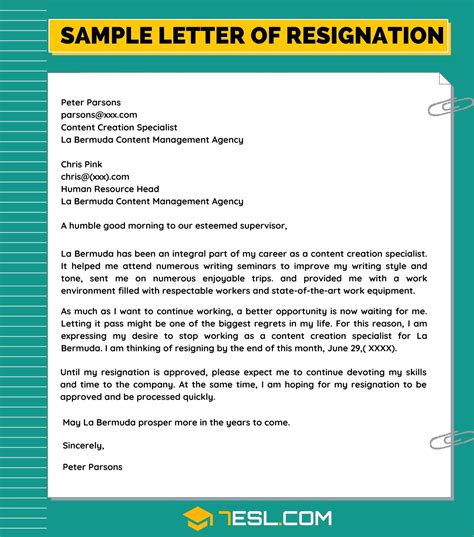Writing A Resignation Letter: Expert Guide & Samples

When it comes to resigning from a job, it’s important to do it in a professional and respectful manner. Writing a resignation letter is a crucial step in the process, and it’s important to get it right. In this expert guide, we’ll provide you with everything you need to know about writing a resignation letter, including tips, samples, and FAQs.
Why is Writing a Resignation Letter Important?
Writing a resignation letter is important for several reasons:
- It’s a formal way to communicate your decision to leave the company.
- It provides a clear record of your resignation.
- It shows that you’re professional and respectful, which can help maintain positive relationships with your former colleagues and employer.
- It can serve as a reference for future job opportunities.
What Should You Include in a Resignation Letter?
A resignation letter should include the following:
- Your name and contact information.
- The date of your letter.
- The name and contact information of your employer.
- A clear statement that you’re resigning from your position.
- The date of your last day of work.
- A brief explanation of your reason for resigning (optional).
- A thank you to your employer and colleagues for the opportunities and experiences you’ve had while working with them.
- A willingness to help with the transition (optional).
- Your signature.
How to Write a Resignation Letter
1. Start with a Professional Salutation
Begin your letter with a professional salutation, such as “Dear [Employer’s Name],” or “To Whom It May Concern.”
2. State Your Intention to Resign
Be clear and concise in stating your intention to resign. For example, “I am writing to inform you that I have decided to resign from my position as [Your Position] effective [Date of Resignation].”
3. Express Gratitude
Express your gratitude for the opportunities and experiences you’ve had while working with the company. For example, “I want to take this opportunity to thank you and the entire team for the support and encouragement you’ve given me during my time here.”
4. Provide a Reason (Optional)
You can provide a brief explanation for your resignation, but it’s not necessary. Keep it professional and positive. For example, “I’ve decided to pursue other career opportunities that align with my long-term goals.”
5. Offer to Help with the Transition (Optional)
If you’re willing to help with the transition, make that clear in your letter. For example, “I’m committed to ensuring a smooth transition and am available to assist in any way I can during this process.”
6. End with a Professional Closing
End your letter with a professional closing, such as “Sincerely,” or “Best regards.”
7. Sign Your Letter
Sign your letter by hand and include your typed name and contact information.
Resignation Letter Samples
Here are two resignation letter samples that you can use as a guide:
Sample 1
Dear [Employer’s Name],
I am writing to inform you that I have decided to resign from my position as [Your Position] effective [Date of Resignation].
Thank you for the opportunities and experiences you’ve given me during my time here. I’ve learned a great deal and am grateful for the support and encouragement you and the entire team have provided me.
Please let me know what I can do to help with the transition during my remaining time here. I’m committed to ensuring a smooth handover and am available to assist in any way I can.
Sincerely,
[Your Signature]
[Your Typed Name]
[Your Contact Information]
Sample 2
To Whom It May Concern,
I am writing to inform you that I have decided to resign from my position as [Your Position] at [Company Name] effective [Date of Resignation].
Thank you for the opportunities and experiences you’ve given me during my time here. I’ve learned a great deal and am grateful for the support and encouragement from my colleagues and supervisors.
Please let me know what I can do to help with the transition during my remaining time here. I’m committed to ensuring a smooth handover and am available to assist in any way I can.
Best regards,
[Your Signature]
[Your Typed Name]
[Your Contact Information]
FAQs
Q: When Should You Give Your Resignation Letter?
A: You should give your resignation letter to your employer at least two weeks before your last day of work.
Q: Should You Discuss Your Reasons for Resigning with Your Employer?
A: It’s up to you whether or not you want to discuss your reasons for resigning with your employer. Keep in mind that it’s important to be professional and positive in any communication with your employer.
Q: Should You Write a Resignation Letter if You’re Being Laid Off?
A: If you’re being laid off, you may not need to write a resignation letter. However, it’s a good idea to confirm the details of your departure in writing, such as the date of your last day of work and any severance or benefits that you’re entitled to.
Q: Can You Rescind Your Resignation?
A: It’s possible to rescind your resignation, but it’s important to discuss this with your employer as soon as possible. Keep in mind that your employer may have already made plans for your departure, so be prepared to discuss the implications of rescinding your resignation.
Q: Should You Give Your Employer Feedback in Your Resignation Letter?
A: It’s up to you whether or not you want to provide feedback in your resignation letter. Keep in mind that any feedback you provide should be constructive and professional.
Writing a resignation letter can be a challenging task, but with this expert guide and samples, you’ll have everything you need to do it right. Remember to be professional, respectful, and positive, and you’ll be well on your way to a successful resignation.
